 Leonard Chess
Leonard Chess 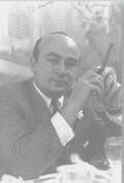 Phil Chess
Phil ChessLeonard and Phil Chess, two Polish born immigrants, founded Chess Records the pre-eminent Blues label of the 50s and 60s.Eventually they created a monopoly of Chicago music recording, doing sessions and releasing recordings by every major blues performer from John Lee Hooker, Elmore James, "King of the Slide Guitar", to Bo Diddley through Jimmy Reed, Chuck Berry and everyone in between. 
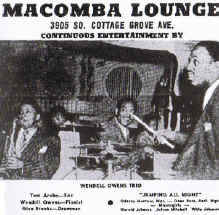
Brothers Phil and Leonard Chess owned the upscale Macamba.night club on Chicago's Southside. Chess Records "Home of the Electric Blues" was started by brothers Leonard and Phil Chess in the late forties. Leonard and Phil Chess - two enterprising immigrant brothers from Poland - bought into fledgling Aristocrat Records, a label that had been formed a short time before by Evelyn Aron and her husband.
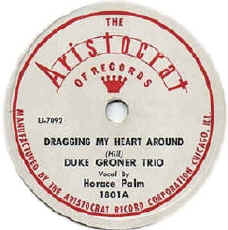
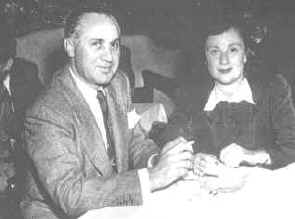
Charles and Evelyn Aron
By the time they got involved with Aristocrat, Leonard and Phil were already aware of what sort of music might sell in the Black community, that of a young Delta-born-and-bred slide guitarist: Muddy Waters. Waters had previously recorded for Columbia, the company but none of his work was released. When he recorded "Gypsy Woman" and "Little Anna Mae" for Aristocrat the Chess brothers found in him the means to distinguish their little company from the hundreds of other independent R&B labels springing up across the country.
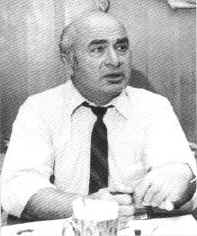 Phil Chess
Phil Chess 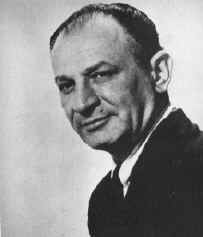 Leonard Chess
Leonard Chess
 Phil Chess
Phil Chess  Leonard Chess
Leonard ChessAt the beginning, Leonard and Phil focused their recording and publishing ventures primarily in the area of popular jazz, but soon expanded into blues, receiving their first Billboard recognition in 1947. By 1949 Aristocratic Records which became Chess Records in 1950, was a fixture in the world of music and its recordings and the songs published by Arc Music remain the most impressive collection of blues music in the world. From their experiences in the nightclub business on the South side of Chicago, the Chess brothers understood the popular preferences of their predominantly African-American audiences, but also saw the marketability of blues music to a broader audience. In the beginning Chess Records was ran as a two man business, with Phil overseeing the nightclub and the offices of Aristocrat/Chess and Arc, while Leonard alternately scouted talent, produced the sessions, and hand delivered fresh recordings to radio stations in the Chicago area.
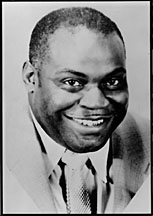 Willie Dixon
Willie DixonSlide guitarist Robert Nighthawk's pre-war popularity made him a nice acquisition, and the 1948 session that produced his "My Sweet Lovin' Woman" was doubly important because it introduced bassist Willie Dixon, an artist whose talent as a producer/songwriter/ session player during the 1950s and 1960s vastly contributed to the label's long-term success.
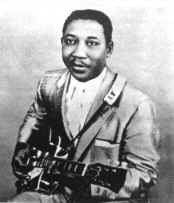 McKinley Morganfield aka Muddy Waters
McKinley Morganfield aka Muddy WatersIn 1950, the Chess brothers launched Chess Records with Gene Ammons' "My Foolish Heart," followed by Waters' "Rollin' Stone." Guitarist Jimmy Rogers made his Chess debut August of 1950, with t "That's All Right" and "Luedella." Little Walter who revolutionized the role of the harmonica in Chicago blues with his astonishing flights of amplified fancy. Walter's legacy is punctuated by his slew of hits during the '50s: "Mean Old World," "Off The Wall," "You're So Fine," and the 1955 Dixon-penned R&B chart-topper, "My Babe."
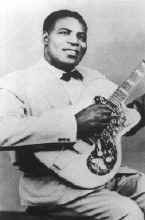 Chester Burnett aka Howlin' Wolf
Chester Burnett aka Howlin' WolfDespite his success with local talent, Leonard Chess, aided by Sam Phillips, began to look outside Chicago for talent. Phillips supervised Memphis pianist Roscoe Gordon's smash "Booted" (1952) and shipped Chess masters by Rufus Thomas, Dr. Isaiah Ross, Joe Hill Louis, and Bobby Bland, but his top contribution to the label's legacy was Chester Arthur Burnett, a.k.a. Howlin' Wolf. With Ike Turner playing the piano both sides of Wolf's first Phillips-produced Chess 78, "How Many More Years" and "Moanin' At Midnight," proved major sellers in 1951. By 1953, Wolf had left Memphis for Chicago, recording more hits including "Who Will Be Next" and "Smokestack Lightnin'."
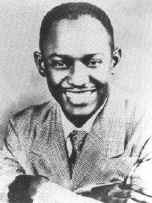 Eddie Boyd
Eddie Boyd 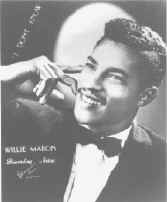 Willie Mabon
Willie Mabon 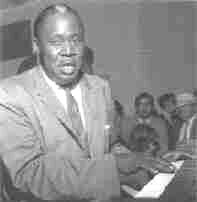 Memphis Slim
Memphis Slim
 Eddie Boyd
Eddie Boyd  Willie Mabon
Willie Mabon  Memphis Slim
Memphis SlimA host of other blues legends recorded for Chess during the early and mid-1950s. Memphis Slim, Eddie Boyd and Willie Mabon, assuredly did. Boyd's 1953 "24 Hours" and "Third Degree" both sold very well, as did Mabon's "I Don't Know" (1952) and "I'm Mad" (1953), both number one R&B smashes.
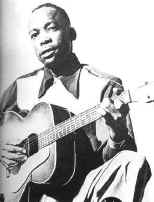 John Lee Hooker
John Lee HookerJohn Lee Hooker first recorded for Chess in 1950. Joe Williams made the charts that same year with "Every Day I Have The Blues." Big Bill Broonzy and Washboard Sam recorded material in '53 that straddled the fence between pre-war Chicago blues and the brasher new style.Memphis Minnie likewise attempted to resuscitate her career with a 1952 Checker single, "Me And My Chauffeur." On the jazzier side of the tracks, saxmen Leo Parker, Tab Smith, Lynn Hope, and Eddie Johnson kept things swinging. By the early-1950s, Water's group added pianist Otis Spann. Though he was now a star in his own right, Little Walter still recorded behind his ex-boss on Waters' immortal "I'm Your Hoochie Coochie Man" and "I'm Ready."
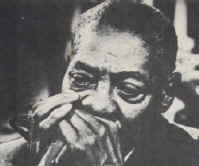 Rice Miller a/k/aSonny Boy Williamson II
Rice Miller a/k/aSonny Boy Williamson IIIn 1955 new talent was added to the Chess stable. Sonny Boy Williamson, a blues legend across the Mississippi Delta thanks to his King Biscuit Time radio broadcasts, joined Checker, a Chess subsidiary label. For his first recording "Don't Start Me Talkin'" Chess paired him with most of Water's band. Bo Diddley was signed in 1955 too. His first two-sided smash for Checker, the self-titled "Bo Diddley" and "I'm A Man.

Chuck Berry
But no one at Chess had the impact on the future of popular music that Chuck Berry did. Berry accepted Water's advice regarding the advantages of working with Leonard Chess, signing with the label in May of 1955 and his first unforgettable hit, "Maybellene." There were also vocal at Chess. Harvey Fuqua's the Moonglows from Louisville had a 1954 hit with "Sincerely," and The Flamingos, a Chicago quintet fronted by Nate Nelson, scored big for Checker in 1956 with their dreamy "I'll Be Home" and "A Kiss From Your Lips."
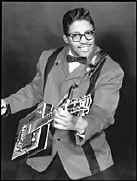
As Berry, Bo, and the vocal groups sold platters by the crates, some of the blues greats that had epitomized Chess during its early years of operation began to recede into the background. But mainstays Muddy, Sonny Boy, and Wolf hung tough, Wolf doing some of his best work during the early '60s when Dixon wrote "Back Door Man," "The Red Rooster," and "Hidden Charms" for him (the latter manically energized by Hubert Sumlin's elastic guitar work).
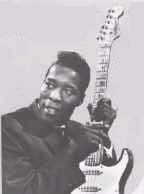
In 1960, Dixon recruited younger Chicago blues talent, signing guitarists Buddy Guy ("First Time I Met The Blues" and "Broken Hearted Blues") and Otis Rush(1960's "So Many Roads, So Many Trains")
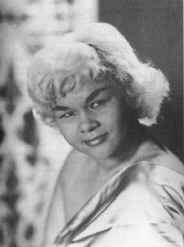 Etta James
Etta JamesEtta James also made her Chess debut in 1960, scoring no less than four hits for the imprint that year alone. Etta's magnificent work for Argo (and later Cadet and Chess) over the next 16 years uncovered depths of passion and pain barely hinted at on her previous waxings. She waxed the torch ballads "At Last" and "Trust In Me" (both major hits in 1961) surrounded by sumptuous strings, rocked the house with a gospel-rooted "Something's Got A Hold On Me" the next year, and set Muscle Shoals ablaze in '67 with her strutting "Tell Mama," sounding equally confident in all three diverse settings.
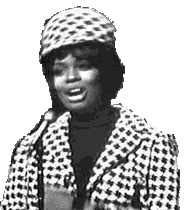 Fontella Bass
Fontella BassIn addition to James had many female artists during the mid-1960s that Jan Bradley ("Mama Didn't Lie"), Sugar Pie De Santo ("Slip-In Mules"), ("I Had A Talk With My Man"), Fontella Bass ("Rescue Me"), Jackie Ross ("Selfish One"), Jo Ann Garrett ("Stay By My Side"), Laura Lee ("Dirty Man"), and the Gems, whose precocious membership included Minnie Riperton. Even Irma Thomas joined the Chess in 1967, recording in Muscle Shoals. protégé Koko Taylor scored the last Chicago blues hit for Checker in 1966 with her growling "Wang Dang Doodle." As rhythm and blues merged with gospel influences to form the basis of soul, Chess was right on top of the trend. Little Milton Campbell who had hits with "We're Gonna Make It," "Who's Cheating Who?" and "Grits Ain't Groceries."
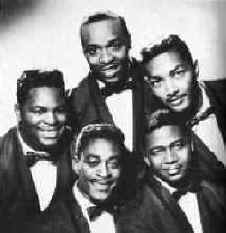 The Dells
The DellsAlong with Little Milton, were the Dells, ("There Is" and "Stay In My Corner") the Radiants ("Voice Your Choice"), Billy Stewart ("Summertime," "Sitting In The Park"), Bobby Moore & the Rhythm Aces ("Searching For My Love"), Tony Clarke, James Phelps, and Bobby McClure. Tommy Tucker's "Hi-Heel Sneakers," a huge '64 hit on Checker, traveled bluesier terrain, while the Ramsey Lewis Trio, with Eldee Young on bass and Red Holt on drums, turned out to be a crossover sensation when their grooving instrumental remakes of "The In Crowd" and "Hang On Sloopy" vaulted up the R&B and pop charts in 1965. Nor was the Chess combine deficient in humor - albums by veteran comics Moms Mabley and Pigmeat "Here Comes The Judge" Markham made sure of that. Chuck Berry remained at Chess into 1966, seemingly rejuvenated after serving a prison term (his 1964 hits included "No Particular Place To Go" and "You Never Can Tell"). After unwisely switching to Mercury Records for a few lean years, he returned home to Chess and scored his biggest pop hit of all in 1972 with "My Ding-A-Ling." Bo Diddley recorded a slew of Checker LPs throughout the decade, his trademark beat never faltering.
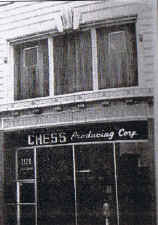 2120 South Michigan Avenue
2120 South Michigan AvenueSo inspired by the magnificent output of Chess were the Rolling Stones that they immortalized the label's famous address, 2120 S. Michigan Avenue, in song on one of their early LPs. During this time, Muddy Waters and Howlin' Wolf tried their best to cope with '60s trends. "Muddy Waters Twist" was admittedly nothing to write home about, but his '63 Folk Singer LP was a heartening return to his Delta roots, and 1969's Fathers and Sons set united Muddy with adoring disciples Mike Bloomfield and Paul Butterfield. Though at the tail end of the decade producer Marshall Chess submerged Waters and Wolf in a quagmire of psychedelia, each legend emerged with his vaunted reputation intact. In 1969, Leonard Chess died, stilling the heart and soul of Chess Records. Earlier that year, he and Phil had sold the company to GRT where producers Ralph Bass and Gene Barge tried their best to hold things together. Sadly, though, the momentum that Chess had long enjoyed quickly began to erode. In 1975, GRT closed down the logo, selling it to All Platinum Records of Englewood, New Jersey. Finally, in 1985, MCA acquired the rights to the massive Chess catalog. At the start of 1987, MCA Vice President of Catalog Development & Special Markets A&R, Andy McKaie began to mount an ambitious long-term reissue campaign of the invaluable Chess masters - an ongoing program that rages full steam ahead all year long in 1997 with the 50th anniversary celebration. "The impact of Chess was far wider and greater than any of the others, ranging from the impact of the Chicago blues sound, the Chuck Berry/Bo Diddley school of rock & roll, and the vocal group sounds," he continues. "The range of that impact was so great that it's still being felt today.
Leonard Chess was inducted into the Rock and Roll Hall of Fame in 1987
Comment
-
Comment by Edie Antoinette on June 8, 2009 at 1:47pm
-
Thanks Gene!
-
Comment by KnightD12 on June 8, 2009 at 12:54pm
-
Great blog Edie. Chess Records is one of the first labels I remember seeing, once I stared collecting records. It goes wayyyy back.Thanks for all the great info and music.
-
Comment by Edie Antoinette on January 6, 2009 at 4:42pm
-
My baby, Evan Christian does a great cover of "Spoonful" by Willie Dixon too on his latest CD.
-
Comment by Edie Antoinette on January 6, 2009 at 4:35pm
-
I haven't seen the movie--"Cadillac Records". When I saw Beyonce warbling my girl Etta's "At Last", something in me was like...uh, no. LOL I have an aversion to that kind of stuff..and especially after reading the info contained here. I have some extensive info on Sonny Boy Williamson that I did back in '05...him and some other Chicago Blues Men...
...remember my Grandpa Basie? Well, he and his brother Clint used to gather with a few other relatives in this basement.They had some homemade corn whiskey. Grandpa played this handmade instrument that was like a corn husk or somethin' (bwa ha ha ha ha at my memory of it), and Uncle Clint would blow on something like a jug top.. ROFLMBO
William....they....would....be...................JAMMIN!!!! I mean they would be getting...DOWN!!!! They were originally from Tuskegee Alabama, where my Daddy was born. Everytime I hear Sonny Boy and nem..I think about Grandpa Basie and his getting down in the basement ♥
...and oh yeah, I remember something else. Somebody had a washboard rubbing something on it. I was about 2 I guess..but I was soakin' that blues IN. LOL
-
Comment by Shelley "SoleMann" King on October 27, 2008 at 7:11pm
-
I remember this Mama Edie...You always do the best blogs, so full of info and great music...SMILE
© 2026 Created by Edie Antoinette.
Powered by
![]()


You need to be a member of I Grew Up In Chicago to add comments!
Join I Grew Up In Chicago